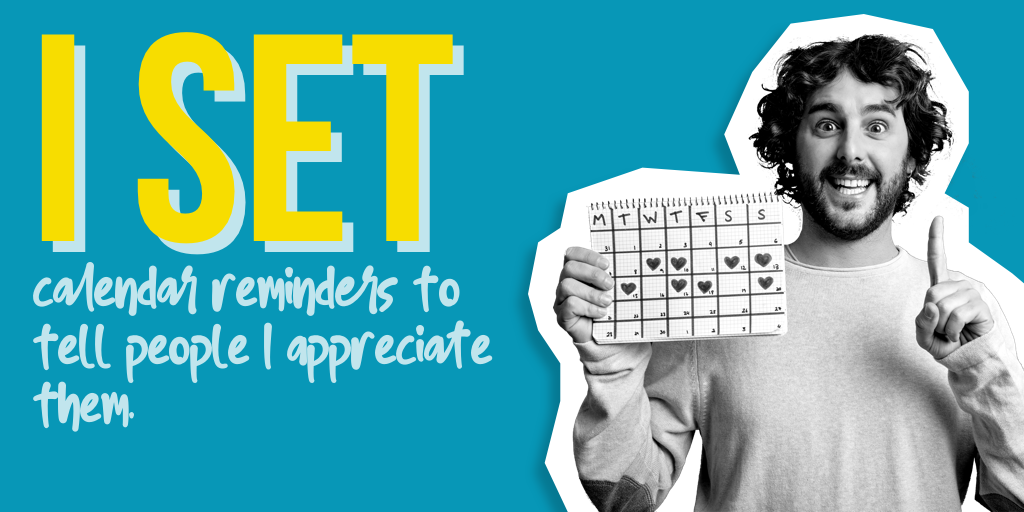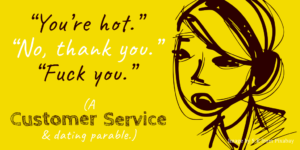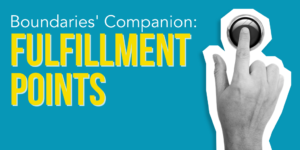Well, I don’t anymore. But I used to. Here’s why:
I write a lot about communication.
It’s important to be able to express needs in a relationship. To discuss our emotions and to be vulnerable. To set and then maintain personal boundaries. To say uncomfortable things compassionately. To overcome misunderstandings and to bridge gaps.
And obviously, lots of people have trouble with these things.
You know what isn’t so obvious, though?
Like so NOT obvious that I’ve been missing it for years, even when it hits me so hard I damn near get whiplash?
That people also have challenges with saying things like:
- I appreciate you.
- You are amazing to me.
- Thank you.
- I want you.
- Your eyes make me melt.
- You make my life better.
- I love how you make me laugh.
Not just the habitual “I love you” when you leave or end a phone call. Or whatever.
SOME people are pretty good about this at the beginning of a relationship, during the NRE (New Relationship Energy) phase, but most aren’t really, unless it’s directly related to things about you that make them want to bang.
- You’re sexy.
- I love your lips.
- Your ass is to die for.
Which are also VERY nice to hear.
But not what I’m talking about.
Many people don’t say good things about their partners on a regular basis.
In fact, I’d hazard to say that many people (most people) don’t give good feedback regularly at all, to anyone.
And over the years, this has been made clear to me by how many people are shocked when I compliment them just because. Even people I date. People I have sex with. People that it should be natural and expected that I feel good things about.
And each time I was shocked that they were shocked.
And finally, it hit me. (I can be slow sometimes.)
Like, this is a missing skill!
And it’s one I developed for myself, so I can share with you how I developed it.
Positive reinforcement is missing.
I first really recognized this in dog training. People focused on punishments and what wass not working with their puppers, and held back praise until they got what they wanted.
Which is THE WRONG FUCKING WAY to do things.
With puppers and with people.
Because it starts a cycle of “Well, I can’t praise them because this thing didn’t go right,” and that, in turn, reduces the joy and the connection and more things go wrong.
And the poor pups would be sooooo confused, because it seemed like NOTHING got them the good stuff and made their people happy, which is all they really wanted.
This happens in relationships, too.
Small annoyances build up, and the nice things we say slow down to a trickle, or die off, and then it’s like we get NOTHING right, and everything starts turning into fights and scuffles.
When instead, we should ALWAYS be looking for ways to praise and reward even for the smallest things, and punish or give negative feedback as rarely as possible.
It’s not always conscious.
I’m not saying that we always think so clearly, and say to ourselves, “I’m gonna hold this back, because I’m cranky.”
Sometimes we do that.
Most of the time, though, we also don’t even really THINK about the good things when annoyances and resentments build up.
We don’t see the small gestures, or appreciate them when we’re fuming about something else.
It’s almost as if we turn off the attractions and appreciation and gratitude in our minds when we are not perfectly happy.
Which is why the good stuff starts tapering off as NRE slows down or ends and reality begins to sink in.
BUT, here’s the thing:
Saying good things to your partner is good for you, too.
Some geeky, science-y brain stuff.
There’s a feedback loop I love to use when I’m doing hypnosis and behavior modification.
It goes like this:
- Trigger them to think with conversation or questions.
- Listen to the words they use.
- Feed what I want back to them using their words.
- Their brain accepts it more readily because it’s familiar language.
You can use this on yourself.
Ever heard of affirmations? They do work. Not like magic, but they can make a difference if you use them right.
Just like visualization practice can improve your skills. AND you can do it to yourself. I do it to myself all the time.
- Think about (visualize, possibly) what I appreciate about my partner.
- Speak it out loud to my partner.
- Hear myself say it.
- Brain feels reinforced, and strengthens that appreciation.
- BONUS! Partner responds with positive reinforcement (smiles, love), and I feel good.
When was the last time you said something negative or nagging to your partner?
Do you know? Was it in the past hour? The past day? The past week?
How many times in the past week or month do you think you’ve said something like:
- I wish you’d [fill-in-the-blank] more often.
- I hate when you [fill-in-the-blank].
- You never [fill-in-the-blank].
- Why don’t you [fill-in-the-blank]?
Etcetera.
And how many times have you given your partner genuine appreciation and positive feedback in that same period? Told them you desire them, that you adore their personality, that they are fascinating to you, or that your life is better with them as a part of it?
(For that matter, when was the last time you did this for your friends?)
And I don’t mean this in a Words of Affirmation way, although that’s nice if it’s one of your partner’s love languages. I mean this in an “it makes your relationship and your life better” way.
Genuinely telling people how grateful and attracted you are reinforces that gratitude and attraction.
Which, I guess, is part of why people don’t do it.
Because when we’re feeling cranky or insecure or troubled about something, it’s incredibly vulnerable to feel that attraction and gratitude, and even more so to speak it out loud.
What if they use it against us? What if it gives them leverage? What if they don’t care?
And so, we shut down.
Which harms our partners, harms our relationships, and stunts us emotionally.
Because it shuts down the parts of us that really love and open up to others. It makes us more likely to notice and speak the negative things and less likely to notice and speak the positive things.
And some of you will recognize this in yourself.
You’re happy and complimentary at the beginning of a relationship (although maybe not as much as you could be), but it eventually slows down. And you probably have plenty of justifications. After all, it’s not like you’re doing it intentionally. You just don’t FEEL it anymore.
Which may be true. In which case, it might be time to leave.
Oh.
Wait.
You don’t want to leave?
Why not? Because when you think about it, you think about what is working. Exactly the things you should be speaking to your partner:
- Because they are actually really sweet.
- Because they make you smile.
- Because they are an amazing lover.
- Because they give good cuddles.
- Because you LOVE them. (Why?)
THAT is where you’re going to start hopefully finding the good stuff that you’re not great at acknowledging.
Calendar reminders for the win!
You’re gonna laugh.
I laugh at myself.
But hear me out. Because real behavior modification works. It’s about creating a habit.
Set a reminder. Create an event in your calendar, then copy and paste it in random intervals of 1-4 days (no more than four days) for three months.
If you’re a total geek and you want it truly random, use the random integer generator, and make the values between 1 and 4: https://www.random.org/integers/
Also, change the times to move throughout the day.
Then, when your alarm goes off, pause and think of something amazing and positive about your partner (or friend, or kid, or whatever), and figure out a way to tell them.
- Send an email.
- Call them.
- Say it to them if they’re with you.
- Get them a card.
- Send it with a meme.
- Text them.
- Put a note in their lunch or on their pillow on on their computer screen.
Sounds contrived?
It is.
But it is also a good way to get back in the habit of thinking and saying good things to others. And eventually, you’ll be at the point where you’ll think more good things habitually, and you’ll say them more naturally as well.
And it may take another three months or a year or longer to get good at it. It took me A LONG TIME.
But we all have to start somewhere. And being bad at saying good things is far better than not saying them at all.
But what if I am upset with them?
What if they are being an asshole? What if they are being inconsiderate? What if I’m annoyed?
That’s OK.
You can be upset with someone’s behaviors and still love the way they make you laugh. Or their eyes. Or the way they hold your hand while you argue.
What if they take that to mean that I’m not upset anymore or I’ve forgiven them?
Gently correct them.
You can both appreciate them AND feel that they are not listening to you in the way you need them to right now, or they are shirking their responsibilities, or that they are being inconsiderate.
But really, won’t that make them feel like they can just keep being that way?
Maybe.
Maybe it will also take some of the stress and pressure out of your relationship and allow them to feel valued and less defensive.
And if they do feel like they can keep being “that way,” just because you’re not being a total butt nugget about it, well, that tells you something about your partner, doesn’t it?
I think so.
And I always think it’s worth telling people when they are awesome. For no other reason than they are and the world doesn’t offer that sort of thing often enough for any of us.
What are your thoughts?
Do you make it a point of telling people positive things about themselves? Like if you asked your partner(s) and friends today, “Do I communicate how much you mean to me?” What do you think they’d say?
Or, “Do you I tell you good things about you often enough?”
Challenge: Ask them. Share, if you’re willing.










